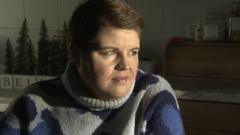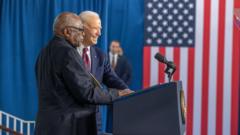As Ireland gears up for its general election, voters express frustration and disappointment over socio-economic issues despite the nation's healthy financial status.
Voter Discontent Amid Ireland's Economic Success

Voter Discontent Amid Ireland's Economic Success
Despite Ireland's economic growth, citizens feel left out as they face rising living costs and inadequate public services.
In the Republic of Ireland, where a budget surplus of €25 billion is projected this year, many voters feel disconnected from the nation’s economic success. Among them is Emma, a mother of four in County Donegal, who struggles with accessing necessary medical care for her children, highlighting a disconnect between financial reports and everyday life. “I hear we are one of the richest countries in the world, but I don’t see it,” Emma expressed.
As polls open for the general election, concerns about housing, healthcare, and immigration are at the forefront. Emma's sentiment is echoed by local journalist Áine Ní Bhreisleáin, who points out that while politicians tout economic improvements, the rising cost of living and inaccessible health services create widespread discontent. With Donegal's vast terrain making it politically challenging, Áine notes that many residents feel neglected by Dublin, unsure how to voice their grievances effectively.
Particularly troublesome is the issue of defective concrete blocks in Donegal, which have led to severe structural damage in homes across the county. Thousands of residents have been affected, and while the government has introduced measures to aid those impacted, the challenges remain enormous.
Compounding these local issues is the growing immigration rate, with over 150,000 new arrivals last year—the highest in 17 years. Local sentiments reflect concerns about equality, as residents feel newcomers are prioritized over long-standing locals who struggle with basic needs.
Greg Hughes, a radio host in Letterkenny, suggests that voter frustration is rooted in the unmet needs of rural communities. Many feel a disconnect between government pronouncements of wealth and their everyday struggles with inadequate public services.
In conversations within local shopping venues, residents express feelings of being “gaslighted” by politicians. Many identify a stark contrast between the country’s economic data and the reality of life in rural areas, where crucial investments in transport, healthcare, and infrastructure are perceived as inadequate.
As Ireland heads into an election cycle, the ruling coalition, which includes Fine Gael, Fianna Fáil, and the Green Party, faces mounting pressure from an increasingly disillusioned electorate. The rising influence of Sinn Féin, which hopes to emerge as the largest party, reflects shifting attitudes as citizens demand more substantive solutions to persistent inequalities and challenges.
In summary, despite impressive economic indicators, voters across Ireland feel increasingly frustrated and disconnected from their government as they confront ongoing struggles with healthcare, housing, and immigration. The upcoming election will be crucial in addressing these discontents.





















